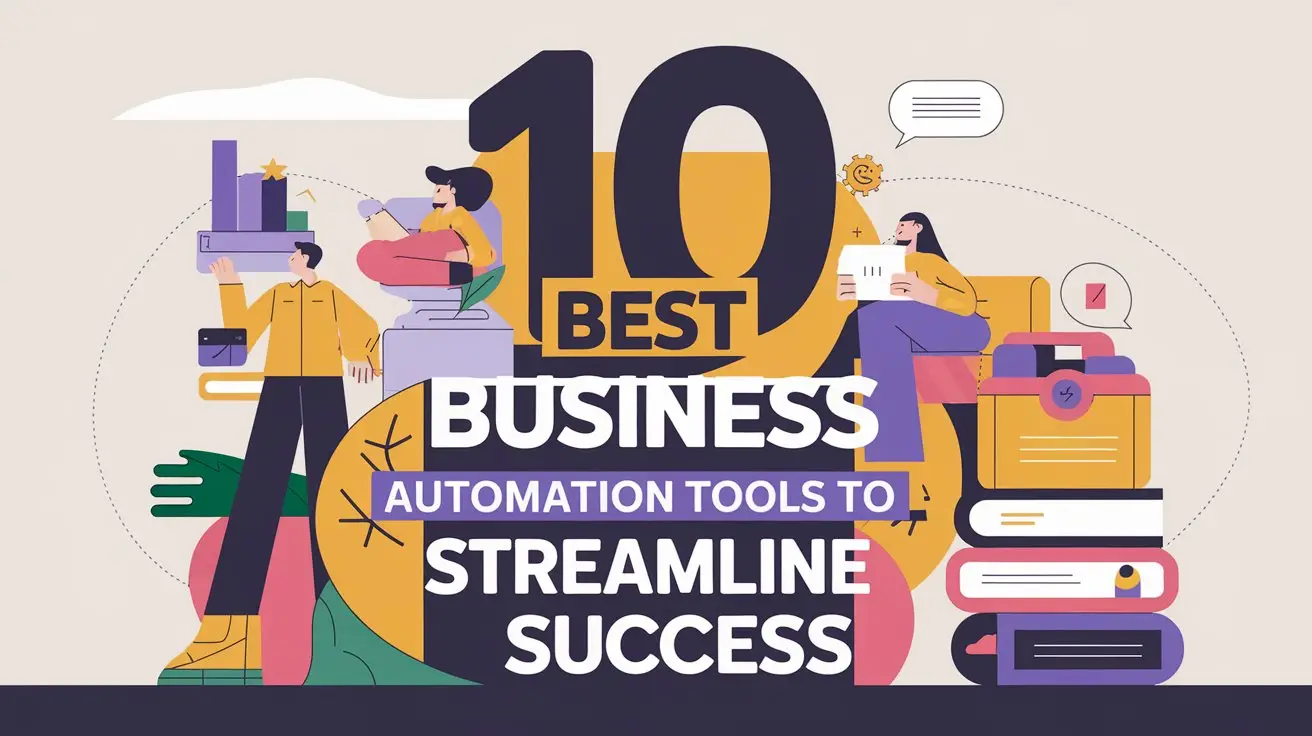Do you love wasting time on manual tasks? Alright, let’s cut to the chase—does manually crunching numbers, chasing down invoices, or replying to emails at midnight sound like your dream job? Didn’t think so. Why haven’t you started using the best business automation tools yet? Seriously, these tools are here to save you time, ditch the stress, and get your business running smoother than whipped cream on a pie.
Whether you’re hustling a side gig, ruling your empire, or launching your dream startup, the top business automation software for startups and the best business automation tools are the secret weapons you’ve been missing.
Automation isn’t just about convenience—it’s a game changer for running a smarter business. That’s why so many businesses are adopting it. If you’re looking for more ways to integrate automation into your workflow, this guide covers strategies tailored for small businesses.
Ready to see how they can totally revamp your workflow and maybe even score you some guilt-free Netflix time? Let’s jump in and check out the tools that’ll blow your mind!
1. Salesforce–The King of CRM

Salesforce is basically the Beyoncé of CRMs. It’s powerful, versatile, and always delivers. Whether you’re nurturing leads, tracking sales, or staying in touch with clients, Salesforce’s automation features make your life infinitely easier.
- Why it’s awesome: It tracks every customer interaction and automates follow-ups so you never drop the ball.
- Use it for: Managing sales pipelines, automating marketing campaigns, and analyzing customer data.
- Best for: Medium to large businesses that are serious about customer retention.
- Bonus: The Salesforce AppExchange is like the App Store for business, offering add-ons for everything under the sun.
Here’s an example: Say you’re running a busy sales team. Salesforce ensures everyone knows exactly where each lead stands. This makes it one of the best business automation tools for managing sales pipelines and customer relationships. Automated reminders and follow-ups mean no lead gets forgotten—ever.
2. Monday.com–One of the Best Business Automation Tools for Small Businesses
 Let’s be honest: juggling projects can feel like herding cats. That’s where Monday.com comes in. It’s one of the best business automation tools for small businesses that makes managing workflows stupidly simple. You can track tasks, assign responsibilities, and automate repetitive actions—all in one place.
Let’s be honest: juggling projects can feel like herding cats. That’s where Monday.com comes in. It’s one of the best business automation tools for small businesses that makes managing workflows stupidly simple. You can track tasks, assign responsibilities, and automate repetitive actions—all in one place.
- Why it’s awesome: Customizable workflows that make sense even if you’re allergic to tech.
- Use it for: Task delegation, tracking project progress, and setting up automated reminders.
- Best for: Entrepreneurs managing remote teams or multiple projects.
- Pro Tip: Automate task notifications so your team stays on top of deadlines without nagging.
Picture this: You’ve got a team scattered across time zones. Monday.com keeps everyone on the same page with real-time updates. It has earned its spot among the best business automation tools for entrepreneurs juggling multiple projects. Deadlines? Check. Project timelines? Double check. You’ll look like a rockstar leader without breaking a sweat.
3. Xero–Simplify Your Finances

Finances stressing you out? Xero is like having a CPA in your back pocket. It’s among the best business automation tools for small businesses to handle invoicing, track expenses, and manage cash flow with ease. It automates the most boring parts of running a business so you can focus on the fun stuff.
- Why it’s awesome: Integrates with over 800 apps and simplifies payroll like a dream.
- Use it for: Invoicing clients, reconciling accounts, and tracking cash flow.
- Best for: Small business owners who want to avoid tax season meltdowns.
- Bonus: The mobile app lets you manage everything on the go.
With Xero, you can literally invoice a client from your phone while standing in line at Starbucks. Talk about multitasking!
4. Zoho One–The All-in-One Suite Among the Best Business Automation Tools for Small Businesses

Zoho One stands out as one of the best business automation tools for businesses. It is like the Swiss Army knife of business tools. It offers over 40 apps for sales, marketing, HR, and more—all bundled together in one affordable package. Seriously, it’s a lifesaver.
- Why it’s awesome: It’s got something for every aspect of your business.
- Use it for: Automating email campaigns, managing HR tasks, and running detailed analytics.
- Best for: Growing businesses that need versatility without spending a fortune.
- Pro Tip: Sync Zoho CRM with your email to streamline customer interactions.
Think about it: You can run your sales campaigns, send invoices, and even manage customer service tickets—all from a single dashboard. No more app-switching headaches.
5. BambooHR–HR Automation Done Right

Let’s talk HR—because no one has time for messy onboarding or manual payroll. BambooHR takes care of all the tedious HR tasks so you can focus on growing your team instead of drowning in paperwork. From hassle-free onboarding to tracking employee performance, it simplifies the entire process and keeps things running smoothly. No wonder it’s considered one of the best business automation tools for small businesses seeking a hassle-free way to handle HR processes.
If you’re exploring more ways to automate your business, check out our e-business automation guide for additional solutions tailored for small businesses.
- Why it’s awesome: From tracking vacation days to sending out offer letters, it handles it all.
- Use it for: Onboarding employees, tracking performance, and managing payroll.
- Best for: Businesses with growing teams that need a streamlined HR process.
- Pro Tip: Use its analytics to identify trends and boost employee happiness. Happy team, happy business.
Imagine onboarding a new hire in minutes instead of days. BambooHR makes the process seamless, giving your newbies a great first impression.
6. Canva–Design Simplified with the Best Business Automation Tools for Small Businesses

Canva is your go-to for creating professional visuals without hiring a graphic designer. Need a flyer, Instagram post, or presentation? Canva’s drag-and-drop interface has your back. Its ease of use and professional templates make it one of the best business automation tools for small businesses.
- Why it’s awesome: It’s so user-friendly, your grandma could use it.
- Use it for: Creating marketing materials, social media posts, and brand assets.
- Best for: Business owners who want top-tier branding without spending a fortune.
- Pro Tip: Save time by using Canva templates for consistent designs.
Whether you’re whipping up a last-minute promo post or a polished investor deck, Canva makes it easy to look like you’ve got your own design team.
7. DocuSign–Hassle-Free Document Signing

Who even uses a printer anymore? DocuSign lets you send, sign, and store contracts digitally without all the paper clutter. It’s fast, secure, and legally binding—basically a lifesaver. No wonder it’s one of the best business automation tools for small businesses, perfect for handling agreements without breaking a sweat.
- Why it’s awesome: It streamlines contract management and approvals.
- Use it for: Signing agreements, collecting client signatures, and storing documents.
- Best for: Professionals who deal with frequent contracts, like real estate agents or freelancers.
- Pro Tip: Integrate it with tools like Salesforce for a seamless workflow.
Need a signature ASAP? Send it through DocuSign and have it signed before you can even finish your coffee.
8. Mailchimp–Email Marketing Made Easy

If email marketing feels overwhelming, Mailchimp is here to save the day. Mailchimp automates your campaigns and tracks performance effortlessly. It’s a clear leader among the best business automation tools for email marketing.
- Why it’s awesome: Intuitive interface with powerful features.
- Use it for: Sending newsletters, running promotions, and nurturing customer relationships.
- Best for: Businesses looking to grow their audience and boost engagement.
- Bonus: Use its segmentation tools to target specific groups of customers.
Whether it’s Black Friday deals or a welcome series for new subscribers, Mailchimp makes you look like an email marketing pro.
9. Airtable–The Spreadsheet on Steroids

Think of Airtable as Excel’s cooler, smarter cousin. It combines the simplicity of spreadsheets with the power of databases, making it perfect for managing everything from inventory to editorial calendars.
- Why it’s awesome: Fully customizable and visually appealing.
- Use it for: Organizing data, automating workflows, and tracking projects.
- Best for: Teams that thrive on structure but hate boring spreadsheets.
- Pro Tip: Use automation to send reminders or updates without lifting a finger.
From tracking orders to scheduling social posts, Airtable is one of the best business automation tools for small businesses to keep everything organized and easy to find.
10. PayPal–Payments Made Simple

PayPal isn’t just for eBay anymore. It’s a must-have for any business that deals with online payments. Its automation tools make invoicing and subscription management a breeze.
- Why it’s awesome: Trusted by millions and ridiculously easy to use.
- Use it for: Sending invoices, managing payments, and handling subscriptions.
- Best for: Service providers, e-commerce businesses, and freelancers.
- Bonus: Use PayPal’s reporting tools to track sales and plan for growth.
Recurring payments for subscription services? Handled. Invoicing clients? Done. PayPal takes the hassle out of managing online payments and invoicing. This proves why it’s one of the best business automation tools for businesses of all sizes.
Top Business Automation Software for Startups That’ll Blow Your Mind

Startup life is chaotic, no doubt about it. But you don’t have to handle every little thing manually—thankfully, the top business automation software for startups can step in to make your life so much easier.
Let’s explore some fresh tools that can help you save time, energy, and a few headaches.
Tools You Should Definitely Check Out
a) Zapier: Think of this as the ultimate middleman for your apps. Zapier connects your tools—like Gmail, Trello, and Google Sheets—so they work together. Need an email sent every time a new order comes in? Done.
- Why you’ll love it: It saves hours by automating repetitive workflows.
- Perfect for: Startups juggling multiple platforms and looking to streamline tasks.
b) PandaDoc: Sending proposals and contracts shouldn’t feel like rocket science. PandaDoc, one of the top business automation software for startups, helps you create, send, and track documents in no time. Plus, its e-signature feature makes the approval process ridiculously easy.
- Why you’ll love it: It shortens your sales cycle with beautifully automated documents.
- Perfect for: Startups handling lots of client agreements and proposals.
c) Calendly: Forget the back-and-forth of scheduling meetings. Calendly lets people book time with you directly on your calendar based on your availability. It’s simple, sleek, and professional.
- Why you’ll love it: Eliminates the hassle of scheduling while keeping things smooth.
- Perfect for: Founders managing meetings with investors, clients, or collaborators.
Why Startups Need Automation

If you’re not using the top business automation software for startups, you’re probably spending way too much time on tasks that could be automated. Here’s how these tools help:
- Streamline Operations: These tools keep your processes running without a hitch, so you can focus on growing your business.
- Enhance Collaboration: With tools like Zapier and Calendly, your team stays connected and efficient.
- Improve Customer Experience: Automation tools ensure clients and customers get quick responses and seamless service.
Why It’s Time to Automate

Startups need to move fast, and automation is how you stay ahead of the curve. The top business automation software for startups takes over repetitive, time-consuming tasks, letting you focus on what truly matters—building your business and smashing your goals. From scheduling to document management, these tools do the heavy lifting.
Ready to Automate?
Let’s cut to the chase—running a business doesn’t mean you have to handle every little task manually. The 10 best business automation tools are here to handle the boring stuff. Tools like Zapier streamline your workflows, while PandaDoc makes contracts a breeze. And for startups, the top business automation software for startups keeps you competitive and on point.
If you’re managing a small biz, the best business automation tools for small businesses can make a world of difference. Want more automation strategies? Check out our full collection of automation guides for expert insights.
Stop sweating the small stuff and start automating today. Don’t wait—your business deserves the upgrade. Let’s make it happen!
FAQs
1) What are the best business automation tools to save time and boost productivity?
Automation tools like Zapier, Xero, and Monday.com reduce repetitive tasks. They free up time so you can focus on growing your business and staying productive.
2) How can the best business automation tools help streamline workflows for entrepreneurs?
Tools like Zoho One and Airtable simplify workflows. They organize tasks, automate processes, and ensure efficiency, making life easier for busy entrepreneurs managing multiple responsibilities.
3) Are there any of the best business automation tools that focus on finance management?
Yes, tools like Xero and QuickBooks excel at finance management. They handle invoicing, track expenses, and generate reports to keep your finances in check.
4) What is the top business automation software for startups to handle team collaboration?
Slack and Monday.com are great for team collaboration. They centralize communication, automate updates, and integrate with other apps to keep startups running smoothly.
5) Does the top business automation software for startups include solutions for scheduling and meetings?
Yes, Calendly is a favorite for scheduling. It eliminates back-and-forth emails and syncs with calendars, making meeting organization effortless for startups.
6) Why should startups consider using the top business automation software for startups over traditional tools?
Startups need speed and efficiency. Automation tools reduce manual work, streamline processes, and scale with your business, unlike outdated, traditional methods.
7) Which are the best business automation tools for small businesses to manage customer relationships?
Salesforce and Zoho CRM are excellent for customer management. They track interactions, automate follow-ups, and help small businesses maintain strong customer relationships.
8) Can the best business automation tools for small businesses improve HR processes like onboarding and payroll?
Absolutely! BambooHR automates onboarding, payroll, and employee tracking. It simplifies HR management, saving time and reducing errors for small businesses.
9) What features do the best business automation tools for small businesses offer to simplify marketing?
Mailchimp automates email campaigns, segmenting audiences for personalized marketing. Canva assists with creating visually appealing materials for small business marketing needs.
10) How do automation tools differ for startups and small businesses?
Startups prioritize scalability and speed, while small businesses focus on affordability and simplicity. Tools like Zoho serve both by offering flexible, customizable features.





Looking forward to your next post. Keep up the good work!
Appreciate the kind words—I’ll keep them coming! You can also check out this one I’ve put together recently:
https://thedigitalpriyanka.com/the-best-passive-income-stream-for-your-zodiac-sign-and-why-it-works/
I do not even understand how I ended up here, but I assumed this publish used to be great
It’s always nice to hear when a post leaves a good impression. Thanks for stopping by!
naturally like your web site however you need to take a look at the spelling on several of your posts. A number of them are rife with spelling problems and I find it very bothersome to tell the truth on the other hand I will surely come again again.
Thanks for the heads-up and for taking the time to share this. I’ll definitely take a closer look and make improvements. Hope the upcoming posts make your visit more enjoyable.
I really like reading through a post that can make men and women think. Also, thank you for allowing me to comment!